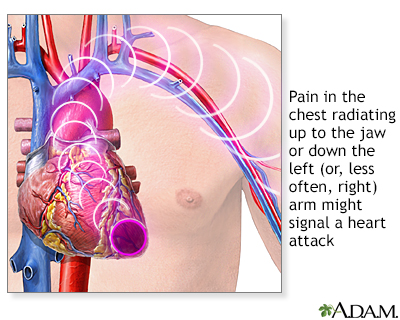Myocardial Infarction

What is Myocardial Infarction?
A myocardial infarction, commonly known as a heart attack, is a serious medical condition that occurs when blood flow to a part of the heart muscle is blocked, usually by a blood clot. This blockage can damage or destroy the heart muscle, leading to permanent injury or even death if not treated promptly.
Who's at risk for Myocardial Infarction?
Several factors can increase the risk of myocardial infarction, including:
- Age: Men over 45 and women over 55 are at a higher risk.
- Family history of heart disease
- High blood pressure
- High cholesterol levels
- Smoking
- Obesity
- Diabetes
- Sedentary lifestyle
- Chronic stress
What causes Myocardial Infarction?
Myocardial infarction is usually caused by the formation of a blood clot in the coronary arteries, which supply blood to the heart muscle. This clot can block blood flow, depriving the heart muscle of oxygen and nutrients. The most common underlying cause of blood clot formation is atherosclerosis, a condition in which plaque builds up inside the arteries, narrowing and hardening them.
How does Myocardial Infarction start?
Myocardial infarction starts when a blood clot forms in a coronary artery, blocking blood flow to the heart muscle. The lack of oxygen and nutrients leads to damage or death of the affected heart muscle cells, resulting in a heart attack.
What are the symptoms of Myocardial Infarction?
Symptoms of a myocardial infarction can vary but may include:
- Chest pain or discomfort, often described as pressure, squeezing, or a feeling of fullness in the center of the chest
- Pain or discomfort in the arms, neck, jaw, shoulder, or back
- Shortness of breath
- Lightheadedness, dizziness, or fainting
- Nausea or vomiting
- Cold sweats
- Fatigue
How is Myocardial Infarction diagnosed?
Diagnosis of a myocardial infarction typically involves a combination of clinical symptoms, medical history, and various tests, such as:
- Electrocardiogram (ECG) to detect abnormal heart rhythms or electrical patterns indicative of a heart attack
- Blood tests to measure levels of specific enzymes or proteins released by damaged heart muscle cells
- Imaging tests, such as an echocardiogram or coronary angiogram, to assess heart function and visualize the coronary arteries
How can Myocardial Infarction be treated?
Treatment for myocardial infarction aims to restore blood flow to the heart muscle as quickly as possible to minimize damage. Treatment options may include:
- Medications to dissolve blood clots, reduce pain, or stabilize heart rhythms
- Percutaneous coronary intervention (PCI), a procedure to open blocked coronary arteries using a balloon-tipped catheter and often inserting a stent to keep the artery open
- Coronary artery bypass grafting (CABG), a surgical procedure that creates a new pathway for blood flow to the heart muscle by grafting a blood vessel from another part of the body
What complications may occur with Myocardial Infarction?
Complications of myocardial infarction can include:
- Arrhythmias or abnormal heart rhythms
- Heart failure due to weakened heart muscle
- Cardiogenic shock, a life-threatening condition in which the heart cannot pump enough blood to meet the body's needs
- Rupture of the heart muscle or blood vessels
How can I prevent Myocardial Infarction?
Preventing myocardial infarction involves adopting a heart-healthy lifestyle and managing risk factors. Some prevention strategies include:
- Eating a balanced diet rich in fruits, vegetables, whole grains, and lean proteins
- Exercising regularly, aiming for at least 150 minutes of moderate-intensity aerobic activity per week
- Maintaining a healthy weight
- Quitting smoking
- Limiting alcohol consumption
- Managing stress through relaxation techniques or counseling
- Monitoring and controlling high blood pressure, high cholesterol, and diabetes
Long-term management of Myocardial Infarction
Long-term management of myocardial infarction focuses on preventing future heart attacks and reducing the risk of complications. This may involve:
- Taking medications as prescribed, such as blood thinners, beta-blockers, or cholesterol-lowering drugs
- Participating in a cardiac rehabilitation program, which includes exercise, education, and counseling to help improve heart health and prevent future heart attacks
- Regular follow-up appointments with healthcare providers to monitor heart function and overall health
What is recent research saying about Myocardial Infarction?
Recent research on myocardial infarction is focused on improving prevention, diagnosis, and treatment strategies. This includes studying the role of genetics and biomarkers in predicting risk, developing new imaging techniques for earlier and more accurate diagnosis, and exploring novel therapies and interventions, such as stem cell therapy or bioabsorbable stents.
Where can I go for more information on Myocardial Infarction?
For more information on myocardial infarction, consult your healthcare provider or visit reputable health organizations' websites, such as the American Heart Association, the Mayo Clinic, the National Heart, Lung, and Blood Institute, or the World Health Organization. These organizations provide comprehensive information on myocardial infarction, including prevention, diagnosis, treatment, and ongoing research.

